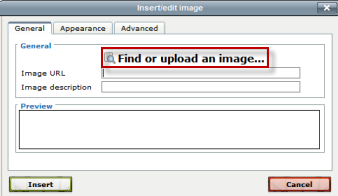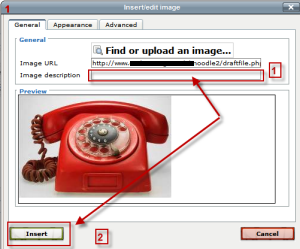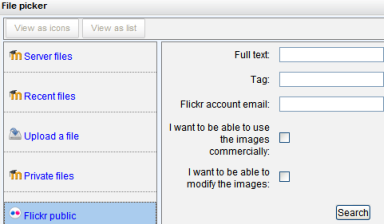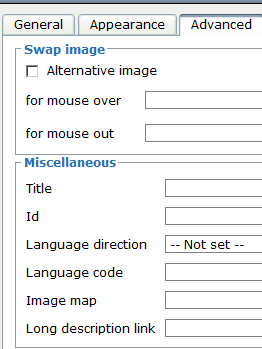Images: Difference between revisions
From MoodleDocs
Mary Cooch (talk | contribs) (adding image info) |
Mary Cooch (talk | contribs) (removed improve template) |
||
| Line 1: | Line 1: | ||
{{Working with media}} | {{Working with media}} | ||
Moodle allows | Moodle allows teachers and students to upload and display images from a variety of sources via the image icon of the [[HTML editor|text editor.]]Courses pages can be enhanced with images (or banners) in each section. Assignments can include images for extra clarification. Images attached to forum posts or quiz questions will appear embedded. | ||
Moodle accepts .jpg,.png., gif format and... | Moodle accepts .jpg,.png., gif format and... | ||
| Line 8: | Line 7: | ||
*''Note:'' It is a good idea to resize your image before uploading, rather than altering its dimensions online. | *''Note:'' It is a good idea to resize your image before uploading, rather than altering its dimensions online. | ||
*With the editing turned on, access the | *With the editing turned on, access the [[HTML editor|text editor]] where you want to display your image (eg, in a course summary,label or page) | ||
*Click the image icon as below | *Click the image icon as below | ||
| Line 25: | Line 24: | ||
==Displaying an image already online== | ==Displaying an image already online== | ||
*If you have images available elsewhere online you can display them too without the need to upload to Moodle. ''Note:'' If the image is taken offline, it will be replaced by a red X on your course page. Also, so-calledhot-linking [http://simple.wikipedia.org/wiki/Hot-linking]to images online if you don't own them yourself is not recommended. | *If you have images available elsewhere online, you can display them too without the need to upload to Moodle. ''Note:'' If the image is taken offline, it will be replaced by a red X on your course page. Also, so-calledhot-linking [http://simple.wikipedia.org/wiki/Hot-linking]to images online if you don't own them yourself is not recommended. | ||
===Method 1=== | ===Method 1=== | ||
*Follow the instructions for Uploading and Displaying an image as above. | *Follow the instructions for Uploading and Displaying an image as above. | ||
| Line 34: | Line 33: | ||
===Method 2=== | ===Method 2=== | ||
*It is possible to copy and paste an online image into the [[HTML|text editor]] in the same way that some students might copy and paste into a presentation. Care must be taken however that images pasted this way are not subject to copyright, and also that the image doesn't come with an unwanted hyperlink. | *It is possible to copy and paste an online image into the [[HTML|text editor]] in the same way that some students might copy and paste into a presentation. Care must be taken however that images pasted this way are not subject to copyright, and also that the image doesn't come with an unwanted hyperlink. | ||
==Adding an image from image hosting sites like Flickr== | ==Adding an image from image hosting sites like Flickr== | ||
*It is possible to search and display an image from Flickr. | *It is possible to search and display an image from Flickr. | ||
| Line 51: | Line 51: | ||
*Choose from the Alignment drop down how you want the image to be set against any text. The block with the tree and text show how each option will display. | *Choose from the Alignment drop down how you want the image to be set against any text. The block with the tree and text show how each option will display. | ||
[[File:Imagealignment. | [[File:Imagealignment.jpg]] | ||
*Resize the image in the dimensions boxes if desired. | *Resize the image in the dimensions boxes if desired. | ||
| Line 58: | Line 58: | ||
===Advanced=== | ===Advanced=== | ||
*This tab | *This tab allows you to set alternative images for mouseover/mouse out and to include miscellaneous information such as title, language direction, long description link etc. | ||
[[File:Advancedtab.png]] | [[File:Advancedtab.png]] | ||
Revision as of 17:12, 18 October 2011
Moodle allows teachers and students to upload and display images from a variety of sources via the image icon of the text editor.Courses pages can be enhanced with images (or banners) in each section. Assignments can include images for extra clarification. Images attached to forum posts or quiz questions will appear embedded.
Moodle accepts .jpg,.png., gif format and...
Uploading and displaying an image from your computer
- Note: It is a good idea to resize your image before uploading, rather than altering its dimensions online.
- With the editing turned on, access the text editor where you want to display your image (eg, in a course summary,label or page)
- Click the image icon as below
- Click into Find or upload an image
- Click Upload a file. Browse for and upload your image. For more information, see File picker
- Add a description of the image(1) and click Insert (2)
- Save the changes.
Displaying an image already online
- If you have images available elsewhere online, you can display them too without the need to upload to Moodle. Note: If the image is taken offline, it will be replaced by a red X on your course page. Also, so-calledhot-linking [1]to images online if you don't own them yourself is not recommended.
Method 1
- Follow the instructions for Uploading and Displaying an image as above.
- After clicking on Find or Upload an image, paste the URL of the image you have online into the Image URL box.
- Add a description of the image and click Insert.
- Save the changes.
Method 2
- It is possible to copy and paste an online image into the text editor in the same way that some students might copy and paste into a presentation. Care must be taken however that images pasted this way are not subject to copyright, and also that the image doesn't come with an unwanted hyperlink.
Adding an image from image hosting sites like Flickr
- It is possible to search and display an image from Flickr.
- For this, the Flickr public repository must be enabled by the administrator
- After clicking into Find or Upload an image, click on the Flickr repository to search for a suitable image.
- The site administrator can also enable the Flickr and Picasa repositories for users to access images from their own accounts.
Editing your image
- After clicking the image icon in the text editor, two tabs are available to help you better display your image:
Appearance
- Choose from the Alignment drop down how you want the image to be set against any text. The block with the tree and text show how each option will display.
- Resize the image in the dimensions boxes if desired.
- If desired, add a number (in pixels) for a vertical or horizontal space or border around the image.
Advanced
- This tab allows you to set alternative images for mouseover/mouse out and to include miscellaneous information such as title, language direction, long description link etc.




